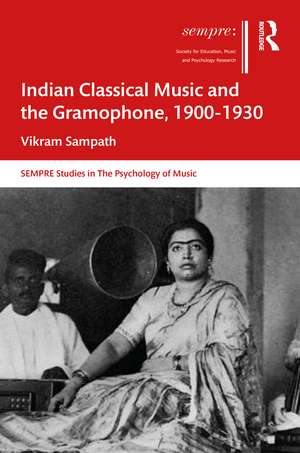Indian Classical Music and the Gramophone, 1900–1930: SEMPRE Studies in The Psychology of Music
Autor Vikram Sampathen Limba Engleză Hardback – 20 iul 2022
| Toate formatele și edițiile | Preț | Express |
|---|---|---|
| Paperback (1) | 389.66 lei 6-8 săpt. | |
| Taylor & Francis – 25 sep 2023 | 389.66 lei 6-8 săpt. | |
| Hardback (1) | 1008.86 lei 6-8 săpt. | |
| Taylor & Francis – 20 iul 2022 | 1008.86 lei 6-8 săpt. |
Din seria SEMPRE Studies in The Psychology of Music
-
 Preț: 200.41 lei
Preț: 200.41 lei -
 Preț: 310.36 lei
Preț: 310.36 lei -
 Preț: 341.55 lei
Preț: 341.55 lei -
 Preț: 280.95 lei
Preț: 280.95 lei -
 Preț: 341.55 lei
Preț: 341.55 lei -
 Preț: 265.84 lei
Preț: 265.84 lei -
 Preț: 415.87 lei
Preț: 415.87 lei -
 Preț: 355.48 lei
Preț: 355.48 lei -
 Preț: 449.41 lei
Preț: 449.41 lei -
 Preț: 445.18 lei
Preț: 445.18 lei -
 Preț: 449.41 lei
Preț: 449.41 lei -
 Preț: 361.08 lei
Preț: 361.08 lei - 18%
 Preț: 1005.80 lei
Preț: 1005.80 lei - 12%
 Preț: 325.34 lei
Preț: 325.34 lei - 13%
 Preț: 324.86 lei
Preț: 324.86 lei - 26%
 Preț: 819.09 lei
Preț: 819.09 lei -
 Preț: 449.41 lei
Preț: 449.41 lei - 18%
 Preț: 1001.51 lei
Preț: 1001.51 lei - 26%
 Preț: 764.20 lei
Preț: 764.20 lei -
 Preț: 488.29 lei
Preț: 488.29 lei - 26%
 Preț: 819.90 lei
Preț: 819.90 lei -
 Preț: 449.41 lei
Preț: 449.41 lei -
 Preț: 449.41 lei
Preț: 449.41 lei -
 Preț: 417.20 lei
Preț: 417.20 lei - 18%
 Preț: 1109.99 lei
Preț: 1109.99 lei - 18%
 Preț: 1055.66 lei
Preț: 1055.66 lei - 18%
 Preț: 1106.81 lei
Preț: 1106.81 lei -
 Preț: 411.42 lei
Preț: 411.42 lei - 18%
 Preț: 1112.41 lei
Preț: 1112.41 lei - 26%
 Preț: 849.37 lei
Preț: 849.37 lei - 18%
 Preț: 1000.27 lei
Preț: 1000.27 lei -
 Preț: 416.22 lei
Preț: 416.22 lei - 18%
 Preț: 1000.27 lei
Preț: 1000.27 lei
Preț: 1008.86 lei
Preț vechi: 1230.32 lei
-18% Nou
Puncte Express: 1513
Preț estimativ în valută:
193.11€ • 202.88$ • 162.29£
193.11€ • 202.88$ • 162.29£
Carte tipărită la comandă
Livrare economică 11-25 martie
Preluare comenzi: 021 569.72.76
Specificații
ISBN-13: 9780367421328
ISBN-10: 0367421321
Pagini: 262
Ilustrații: 24 Tables, black and white; 26 Line drawings, black and white; 14 Halftones, black and white; 40 Illustrations, black and white
Dimensiuni: 156 x 234 x 16 mm
Greutate: 0.7 kg
Ediția:1
Editura: Taylor & Francis
Colecția Routledge
Seria SEMPRE Studies in The Psychology of Music
Locul publicării:Oxford, United Kingdom
ISBN-10: 0367421321
Pagini: 262
Ilustrații: 24 Tables, black and white; 26 Line drawings, black and white; 14 Halftones, black and white; 40 Illustrations, black and white
Dimensiuni: 156 x 234 x 16 mm
Greutate: 0.7 kg
Ediția:1
Editura: Taylor & Francis
Colecția Routledge
Seria SEMPRE Studies in The Psychology of Music
Locul publicării:Oxford, United Kingdom
Public țintă
PostgraduateNotă biografică
Vikram Sampath is a Bangalore-based historian who has authored six acclaimed books on Indian history and classical music. He is a Fellow of the Royal Historical Society (UK), recipient of several awards such as the Sahitya Akademi’s Yuva Puraskar for English literature and the ARSC Award for Excellence in Historical Research in Music. He has founded India’s first online digital sound archive for vintage gramophone recordings called Archive of Indian Music.
Cuprins
1 The Exotic East
2 The Mechanised West
3 When the Twain Meet
4 The Protagonists
5 The Abolition and Thereafter
6 Analysing the Recordings
7 Conclusion
2 The Mechanised West
3 When the Twain Meet
4 The Protagonists
5 The Abolition and Thereafter
6 Analysing the Recordings
7 Conclusion
Descriere
Vikram Sampath sheds light on the role and impact of The Gramophone Company’s early recording expeditions on Indian classical music by examining the phenomenon through a socio-cultural, historical and musical lens.
